Lost and found! October, October… you are so beautiful and cozy! Every book I read in October had its own version of lost and found, and in these book reflections, I want to dive deeper into each of these versions and why they are so relatable. Lost and found is complex, deep, heart-wrenching, and humorous at times, unfolding within all of us in one way or another. I couldn’t be happier with my book picks for this autumnal month, which is full of color and life but also demands our care and attention.
Oftentimes—when I’m writing these reviews—I ponder what all of these books, which I randomly and intuitively pick, have in common. It’s often not very obvious, but then an idea festers and a feeling emerges, and all of a sudden, there it is: the main theme! This realization makes me view the books in a different light, as if each one tells a story that leads to another, like breadcrumbs (good breadcrumbs 😉 ) that guide you to a treasure chest. This is what books feel like to me. There are certain themes that keep repeating; some are seasonal, some personal, and then there are themes that are a blend of everything mentioned.
As I type these words, I’ve been pondering the meaning of lost and found for me during this time in my life, and it’s a beautiful sensation that tickles my heart. It’s bittersweet in a way and takes me to a deeper level of understanding myself and my relationships. I think that’s why my focus for this month—and the months to follow—is writing about relationships.
Anyway, let’s get into these amazing gems of fiction!
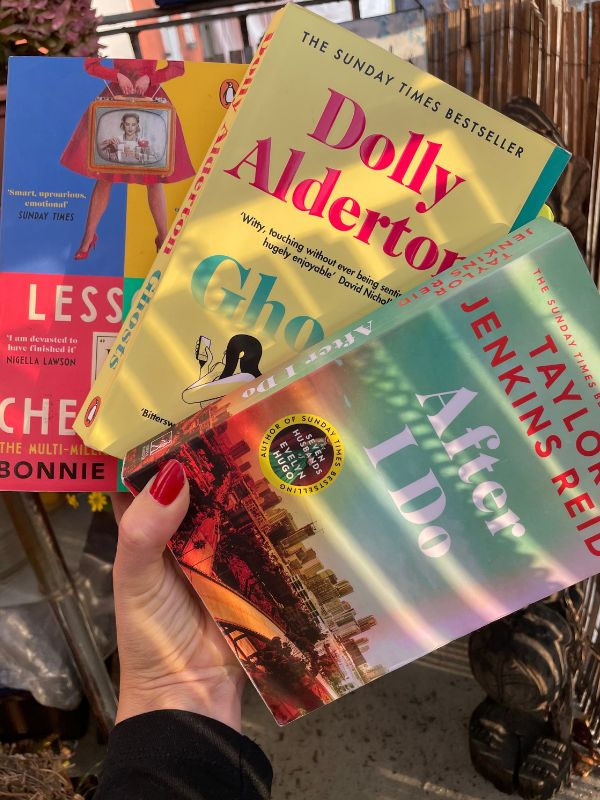
AFTER I DO by Taylor Jenkins Reid
(first published: July 1, 2014; Publisher: Atria Books; 352 pages, Paperback)
My rating: ⭐⭐⭐⭐⭐ (5/5)
(read book: October 16, 2024)
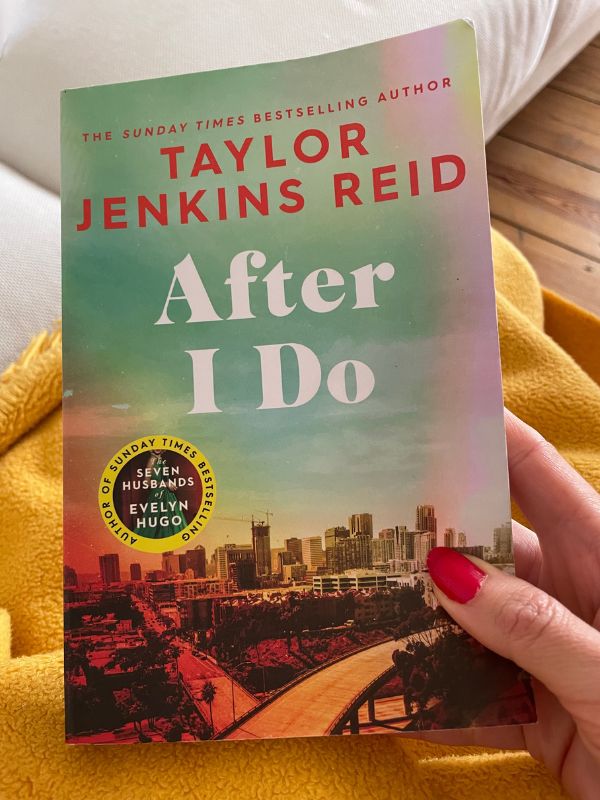
(This review contains spoilers)
Oh my gosh, After I Do by Taylor Jenkins Reid is everything. She just knows how to wrap her words around my heart, gently squeezing as she led me through one of the most beautiful, raw journeys of love, loss, and rediscovery. I felt every word, every page, every chapter because I could relate on every level.
This was my fourth book by her, and let me tell you, Reid just knows how to speak to the soul. I hope you will pick up one of her amazing novels (all bestsellers for a reason). I mean, her writing is like a warm embrace, reaching right into the reader’s heart with such compassion, grace, and elegance that you feel every ache, every doubt, every ounce of hope.
And that is why I love her work so much: she makes you believe that there’s always hope in the messiest of messes, in the most chaotic and intense moments that life throws at us. And After I Do has captured my heart and healed parts of me. I love when fiction does that. Books are balm for the soul.
A Love Lost and Found: The Heart-Wrenching Journey of Rediscovering What Matters Most (After We Screwed Up)
The story follows Lauren and Ryan, a couple who, once upon a time, couldn’t imagine life without each other. They met when they were young. They loved fiercely, with all the intensity and thrill that come with being in love. This was a different kind of love—a love that touches all of you, that imprints on you, and thus you are forever changed.
But as time goes on, they drift—finding themselves asking that devastating question: Why are we even doing this anymore? They don’t hate each other. But they’ve lost each other. And they don’t know how or when it even happened. Oh, can’t we all relate a little?! It’s such a relatable, subtle pain—the kind of heartbreak that can sneak up even on the happiest of couples. Reid doesn’t sugarcoat this. Instead, she shows us that even the most profound love needs nurturing; it requires work, tenderness, and intention. As always, she captures the essence of it all, and that’s why I think she’s a hell of a writer. (Please, Taylor Jenkins Reid, never, ever stop writing!)
What I loved most? Lauren and Ryan didn’t just throw in the towel. I mean, they could have. That’s what a lot of couples do—they throw in the towel and often overlook that this can be an invitation to go on a quest, a quest of self-discovery, love, and purpose.
Thank God, Lauren and Ryan chose a break—in their case, a full year apart to figure out who they are and if they still want to be together. It’s bold, it’s raw, and let’s be real—how often does “taking a break” lead to anything other than separation? But Reid pulls off this miracle of hope and growth—as she always does—and she gives Lauren and Ryan the grace and courage to rebuild, rediscover, and decide who they want to be as partners and as individuals. It’s a journey that’s healing to watch unfold.
Oh, my heart!
Lauren’s Transformative Quest for Self
Lauren is such a beautifully complex character. She’s real—she’s frustrated, heartbroken, lost, and at times selfish. She goes from being this woman who thought she had all the answers, someone who thought love was a given, to realizing that love is a choice, a commitment that needs to be made day after day. I loved watching her step into her own space, finding herself outside of the relationship. She’s someone who loves deeply but needs to know herself just as deeply, and the courage it takes her to face her own doubts and insecurities is absolutely inspiring.
Ryan: From Complacency to Commitment
Ryan, on the other hand, is more understated but equally compelling. He’s the quiet strength of the relationship—oh those email letters—, someone who feels things deeply but doesn’t always know how to express it. And that is when it becomes tricky and unhealthy. Ryan’s journey is one of understanding his role in the relationship and his own unmet needs.—Gosh, I love the characters! Did I already mentioned it?!—His character shows the silent struggles that often get overlooked in relationships—the unspoken resentments, the hidden disappointments.
Yet, like Lauren, he doesn’t give up. Ryan’s growth is subtle but so powerful as he learns to open up, to be vulnerable, and ultimately, to choose love in a more conscious, present way.
Let’s Get to The Point!
I first need to talk about the unsent emails Lauren and Ryan unknowingly wrote to each other. When I read that, I experienced a full-on flashback: my former self sitting in front of her laptop, typing out all the things she wanted to tell the man she loved with all her heart when they were separated. It was that kind of love that makes you feel the world differently—a love that touches your soul in ways you could never have imagined.
She never sent those emails, and after years, she forgot the password for that account, and eventually, it was deleted. And so were her unsent emails and everything that reminded her of him. I was that person, and it’s fascinating how life brings things back to help us process and heal them even more—in my case, 18 years.
In After I Do, Reid doesn’t just tell a love story; she lets us feel the heartbeat of a real relationship. The novel asks us to look at love not as a fairy tale but as an ongoing choice—an everyday choice! This story is for anyone who’s ever loved deeply, felt lost in a relationship, and wondered how to keep love alive amid life’s challenges. Reid writes with so much grace, delicacy, and truth, making this book an absolute gift for couples at every stage. This book isn’t just a novel; it’s a guide, a companion, a comfort. Taylor Jenkins Reid’s work here is nothing short of soul-stirring.
Beyond After I DO: Reviews of Taylor Jenkins Reid’s Books
Some of My Favorite Quotes
“He probably slept with the first woman who looked at him the right way.” I take a long sip of my soda. It becomes a gulp and then sort of a chug.
“Do you think it’s with someone prettier than me?”
“How on earth would I know that?” Mila says. “You have to stop torturing yourself. Accept that is has probably happened. The stress of questioning whether it has or has not happened is too much. You have to just assume that it has happened and start to deal with it. He slept with someone else. What are you going to do?”“Die, mostly,” I say. Why does this feel so awful? Why does it feel so much more awful than when he left? Deciding to separate was hard. Actually separating was hard. But this? This is something entirely different. This is devastating. This is…I don’t know. It feels as if I will never feel better in my life.
It’s Ryan. It’s always been Ryan. Just because I can live without him doesn’t mean I want to.
Why do we undervalue things when we have them? Why is it only on the verge of losing something that we see how much we need it?
I want to roll around on the floor with him. I want to smell his hair. I want to kiss his neck. I want to sneak into one of those doctor “on call” rooms they have on soap operas and make love to him on the bunk beds. I want to show him what I have missed. Show him what he has missed. Show him what I have learned. I want to lose sight of where I end and he begins.
LESSONS IN CHEMISTRY by Bonnie Garmus
(first published: March 31, 2022; Publisher: Doubleday; 390 pages, Hardcover;
British Book Award Nominee for Début Fiction (2023), Australian Book Industry Award (ABIA) for International Book (2023), Goodreads Choice Award for Debut Novel and Nominee for Historical Fiction (2022), Waterstones Debut Fiction Prize Nominee for Shortlist (2022), Barnes & Noble Book of the Year Award (2022))
My rating: ⭐⭐⭐⭐⭐ (5/5)
(read book: October 27, 2024)
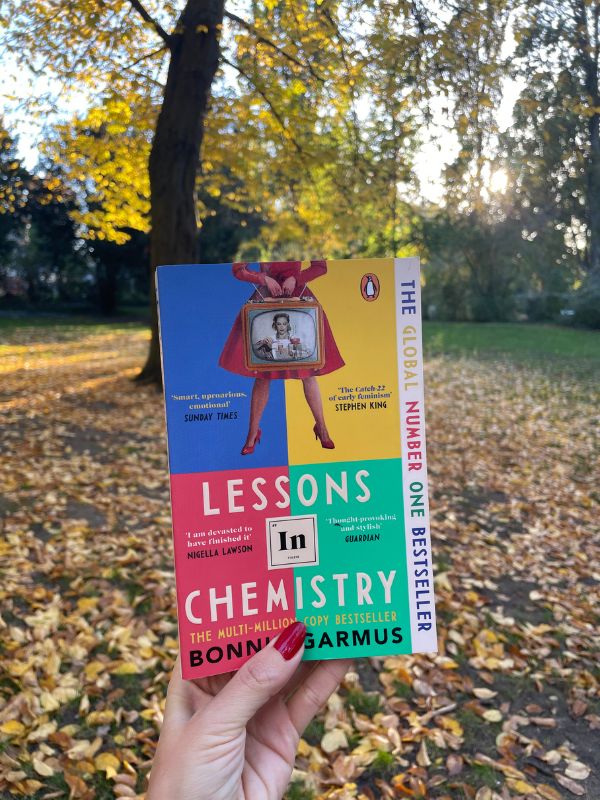
Oh my gosh! At last! Lessons in Chemistry has been sitting on my bookshelf for months, waiting patiently. It wasn’t that I wasn’t intrigued, but somehow, it never felt like the right time. Do you experience this, too? It’s a phenomenon of its own. You feel so drawn to certain books, there’s just something about them when you glance at the shelves in a bookstore, that unmistakable pull to buy them. Some you dive into immediately, while others need to rest quietly on your shelves, waiting for the right moment to reveal themselves. I find it so fascinating!
And here we are, October was the month for Lessons in Chemistry.
A Stunning Tapestry of Love, Justice, and the Free Spirit in Lessons in Chemistry
When I finally dove in, I was completely captivated. Bonnie Garmus has crafted something truly magical here. The way she structured this novel, the seamless dance between past and present, the intentional yet natural-feeling side stories—all of it flows together like a river, carrying you along and never letting you go. Garmus’s style of storytelling is compelling, captivating, and such a joy to read.
Every character feels real, deeply nuanced, and full of purpose. And those side stories? In other novels, they can sometimes weigh down the main plot as I felt it in Remarkably Bright Creatures. But here, each one felt essential, drawing me in further. It’s as if Garmus knew exactly how to balance these elements without losing the central heartbeat of the story. I loved every detail she wove in.
Lessons in Chemistry is so much more than a charming novel. It’s a powerful, resonant read for both women and men. Yes, I know STEM purists have raised eyebrows about the science here and there, but let’s remember—this is fiction. And Garmus’s point is brilliantly clear: she’s capturing the trials, the grit, and the sheer resilience of women pushing back against the limitations set by a male-dominated world. Elizabeth Zott’s character may feel exaggerated, but sometimes that’s what’s needed to shine a spotlight on the harsh truths so many women faced (and still face!). To me, this story is both a tribute to women’s journeys and a call for a world where everyone’s potential is respected.
And Elizabeth herself—wow. She’s beautifully flawed, fiercely intelligent, and unafraid to be herself. I love that Garmus chose to portray Elizabeth’s feminist spirit as both empowering and honest, acknowledging the strengths and doubts many of us feel. Feminism is complicated, and while I, too, have my questions and doubts, there’s no denying the significance of this era in women’s history. Garmus reminds us that, at times, it’s necessary to push boundaries and swing to the extreme to bring the world back to a more balanced place.
Then there’s the love story. Elizabeth and Calvin’s relationship is gorgeous, heartbreaking, and absolutely healing. It’s the kind of love that doesn’t come around often—a love rooted in mutual respect and understanding, a connection that goes beyond chemistry, straight to the soul. Their love was beautifully bittersweet, a love that’s lost but somehow always found.
Another beautiful touch is the exploration of belief. I appreciated Garmus’s openness here, allowing characters to ponder questions of faith without pushing an agenda. I believe in God, not in a religious way but in a spiritual sense, and I loved that this novel respects the diversity of beliefs. We’re all on our own paths, and in the end, we’re human—all of us, connected, and in need of acceptance and understanding.
Lost and Found: Weaving Themes of Redemption
And this brings me to the theme of lost and found, which is woven throughout the novel. You feel it in every chapter. Throughout the novel, readers experience love that’s lost and later found, hopes that flicker back to life, and relationships that mend after periods of estrangement. Garmus leaves us with a sense of trust in life’s mysterious ways, showing that somehow, everything works out as it should. Each “lost and found” moment is like a breadcrumb on a journey, leading readers toward an emotional and satisfying conclusion.
This book is a testament to having faith that life will work itself out, that sometimes things are orchestrated in ways we can’t fully understand until the pieces come together.
In Lessons in Chemistry, Garmus captures the heart and soul of the feminine free spirit, delivering a story about love, justice, and the unyielding power of a woman determined to be exactly who she is.
In Lessons in Chemistry, Garmus captures the soul of the feminine free spirit, giving us a story that’s not only about love and justice but about reclaiming the self. It’s about what happens when we refuse to let others dictate who we can be. This book is an absolute gift, a guide, and a comfort—a must-read for anyone who’s ever felt like they had to find their way back to themselves. I couldn’t recommend it more.
Let’s dive into some of the most important characters a bit deeper, shall we?
Elizabeth Zott
Elizabeth is unforgettable. She’s a woman who refuses to conform: a true rebel, challenging the limits placed on her by a society—and a workplace—that can’t quite handle her brilliance. Elizabeth’s drive, her curiosity, and her unapologetic intelligence make her magnetic. But what I found most compelling about her wasn’t just her brilliance in science; it was her fierce love for her daughter, Mad, and her one true love, Calvin. She’s a warrior of a woman, grappling with personal and professional obstacles yet still moving forward. And yes, there’s something iconic about a character who proves you can be both feminine and formidable in any field.
Calvin Evans
Oh, Calvin. He’s the rare kind of partner who doesn’t just support Elizabeth but sees her. A scientific genius himself, he meets Elizabeth on equal ground, falling for her mind as much as her heart. Their relationship is both tender and deeply intellectual, creating a love that feels beautifully rare and refreshing. Calvin’s sincerity and vulnerability add warmth to the story, and even in his absence, he remains a profound part of Elizabeth’s journey. The love between him and Elizabeth is pure, healing, and genuine—an emotional anchor that keeps you turning the pages.
Mad (Madeline) Zott/Evans
Mad is every bit her mother’s daughter—intelligent, curious, and resilient. Through Mad, we see a legacy of independence and strength forming at a young age. Her hunger for knowledge and her determination to piece together her family’s history is inspiring, and she brings a raw innocence to the novel that reminds us of what’s possible when young girls are taught to believe in their worth. Gosh, how I love that!!! Her journey of understanding both her parents’ legacies is heartwarming and full of hope.
Harriet
Harriet is the voice of reason, grounding Elizabeth in moments of doubt. The mother Elizabeth never really had. She’s loyal, understanding, and unafraid to push Elizabeth to see the bigger picture, because let’s be honest Elizabeth can be quite stubborn.
Harriet is a true friend, one who’s lived her own struggles and chooses to lift others up along the way. In many ways, she embodies that supportive friend we all need—the one who listens, holds us accountable, and helps us see our own potential.
Ms. Frask
Oh, Ms. Frask! Here’s a character you want to dislike initially—she’s tough on Elizabeth, even adding to the misogyny Elizabeth faces at work. You really want to not like her. But I asked myself why is she so hostile. Ms Frask’s character is pretty complex; her bitterness and rigidity come from her own grief, from the injustice she’s faced as a woman with big dreams held back by societal limitations. Eventually, she sees herself in Elizabeth and shifts from adversary to ally.
This change is a beautiful reminder that sometimes, the people who initially stand against us are dealing with their own wounds and have much more in common with us than we think. In the end, Ms. Frask becomes Elizabeth’s unlikely but vital supporter, proving that real change can start with compassion and empathy. I loved this transformation particularly as this is one of my favorite topics to discuss, and I loved how it adds another layer to the story, showcasing how healing and solidarity between women can transcend rivalry.
Simply wonderful!!!
GHOSTS by Dolly Alderton
(first published: October 15, 2020; Publisher: Fig Tree; 352 pages, Hardcover)
My rating: ⭐⭐⭐⭐⭐ (5/5) (can I give it more stars, please 😉 )
(read book: October 31, 2024)
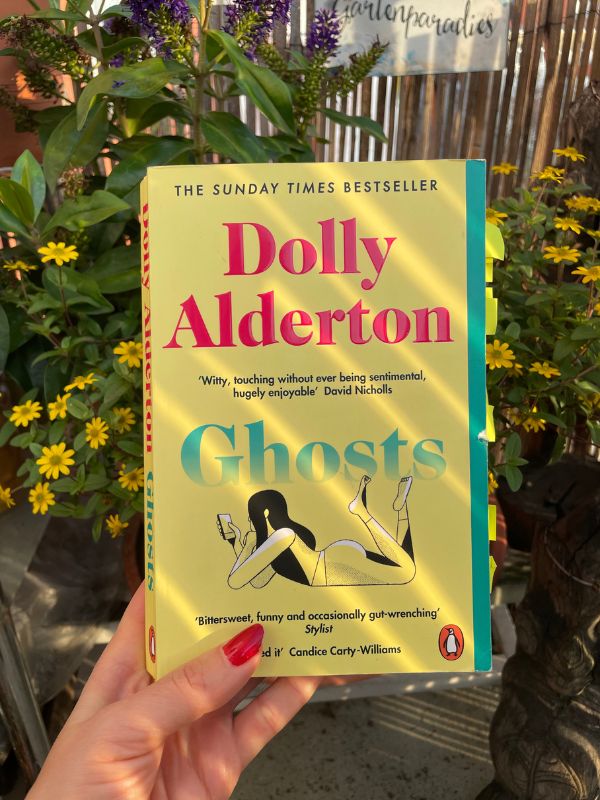
I needed this book! I didn’t know how much I needed this book. Thank you, Dolly Alderton. I want to be your friend! 🙂
Ghosts wasn’t on my booklist for October, but when I went to my favorite English bookshop in Berlin (Dussmann – Das Kulturkaufhaus), I saw it again—there in the beautiful bookshelves, and I felt an urgent pull. I felt magically drawn to it. I like when that happens.
I have so many bookmarks in this copy; it’s insane! I could write about so many things tackled in this novel.
It tells the story of Nina George Dean. She’s in her thirties: single, childless, successful… but as she navigates her life in London, she starts to feel the weight of expectations—both from others and from herself. Her friendships are fading as her friends start families, become less available, and all of a sudden, Nina is left wondering if she’s falling behind.
When she meets Max, a man who seems quite charming in every way, she throws herself into a whirlwind romance with him and begins to feel hopeful about love again—only to find that things are never as simple as they seem. Or are they?
As Nina juggles the ups and downs of modern relationships, social media, and the pressures of adult life, she’s forced to confront what truly matters. Ghosts is a beautifully written, honest look at the complexities of love, loneliness, and the journey of finding oneself in a world that often feels like it’s fake and moving too fast.
A Masterpiece and so relatable
Ghosts by Dolly Alderton is a masterpiece that hit me right in the heart. I loved it. It was perfect for me, and I suspect it will be for many women in their thirties navigating the complexities of adult life and love, just like Nina. Her story is so incredibly relatable, and I felt deeply heard and seen in every page.
In a world where the dating scene has turned into a mess of ghosting and mixed signals, it’s refreshing and reassuring to know we’re not alone. Nina’s experiences in the dating world, from the “ghosting” to the confusion of modern relationships, felt painfully real—and I appreciated every word of it.
Yes, it does get lonely when most of your friends start families, and yes, friendships do change or sometimes end because of it. The pain is real, and it leaves you feeling left out, like you’re missing something everyone else has. It gives the impression that you’re not living your best life, that you’re not good enough. For some of us, like Nina and myself, things come a bit later in life—and while I’ve embraced that journey, I still understand the growing pains when everyone else seems to have what you want. But it offers so much room for healing. So know, wherever you are is exactly where you need to be.
This book is not just entertainment. It’s a guide—a raw and honest look at navigating your thirties (and maybe even your forties)—the pitfalls, the struggles, and the loneliness that so many of us feel.
If you want to read on, please note that the following breakdown and analysis contains spoilers!
The Roller Coaster of Modern Dating: Red Flags, Ghosting, and the Emotional Chaos of It All
Now, let’s talk about Max. Oh, the alarm bells went off immediately. I could write a dissertation on him and the horrors of (online) dating, as so many of us could. Max is a walking red flag. The fact that he doesn’t even tell Nina he’s a smoker, or that he makes her sit outside in the cold just because he wants to smoke—oh my God, it’s enough to make you scream! What an (excuse my language) a-hole.
And yet Nina, drawn to him, lets it slide. Been there, done that. It’s tough to admit when you’re emotionally invested in someone who clearly has communication issues. Without communication there’s no relationship! The fact that he disappears for three days after their first kiss? It’s a perfect snapshot of how brutal, careless, and selfish the dating scene can be. People ghost, people move on to the next with one finger slide, and nobody seems to care.
Then, of course, Max messages her. And Nina, vulnerable and hopeful, she falls for him. The thing that struck me so hard was the fast-paced, intense whirlwind romance that Max initiated. The man was a roller coaster, pulling Nina along without any real direction. And this, my friends, is a crucial truth about modern relationships: If a man doesn’t know who he is and doesn’t have a clear purpose, you can be sure he won’t know where he’s going with you either. In this case, what does Max do? He ghosts her. Oh, my heart felt for her.
Alderton nailed the phenomenon of modern-day ghosting. You can clearly tell, she’s done her research, and you can feel the authenticity in every word she writes. Her talent shines through in the way she captures the emotional roller coaster of dating, the hope, the pain, and the self-doubt. But also the growth and healing that come out of it as a result.
But what makes it even more remarkable is that Max doesn’t just disappear and leave Nina in her grief—he comes back—of course when Nina has moved on and did her soul searching—but there he is promising change. And Nina, despite everything, takes him back. But I loved her observation.
“All these women that end up as the collateral damage of your confusion, Max. What are you so confused about!” (Nina)
Oh, I wanted to shake her! I kept thinking, Don’t take him back, Nina! Can you really trust him after everything he’s done? He may say he’s changed, but he hasn’t healed. And until he does, the cycle will repeat. And sure enough, three months later, he ghosts her again.
The heartache, the confusion, the betrayal—it all comes crashing back. He didn’t change; he just took Nina on another emotional roller coaster. It’s brutal, and it’s exactly what we see happening in the modern-day dating scene: careless, selfish, and devoid of real accountability.
The Evolving Tides of Friendship
But it’s not all about heartbreak. Ghosts also delves deeply into the evolving dynamics of Nina’s friendships, and this is where Alderton’s brilliance truly shines. The way she explores the shifting tides of friendship as we age is something many of us can relate to, especially as Nina navigates her thirties. It’s so easy to feel like we’re losing touch with those who once meant the world to us as our lives change. But Alderton doesn’t just show Nina’s perspective; she gives us a glimpse into the experiences of her closest friends too, particularly through one of Nina’s best friends as the story unfolds.
We see how friendships grow and sometimes fade, how priorities shift as people settle into their own lives, and how complicated it can be to maintain connections when everyone seems to be moving in different directions. The loss of closeness with her friends, especially as many of them start families, feels both heartbreaking and liberating for Nina. These transitions mirror the larger changes she’s experiencing in her own personal journey: the tension between what she’s expected to have by this age and what she’s still learning to embrace.
In one particularly poignant moment, Alderton shows how these friendships don’t necessarily disappear but evolve. They transform into something different. Nina’s bond with her best friend, once a constant source of support and shared experiences, becomes strained.
But there’s also beauty in this transition—sometimes, what is “lost” isn’t actually gone forever, it’s just changing shape. Alderton portrays the fragility of relationships so honestly, giving voice to the quiet heartbreak that comes with realizing that the closeness you once had might not look the same anymore. Yet there’s still a kind of hope in that—because what Nina finds in the end isn’t just a resolution with Max or a relationship, it’s a rediscovery of her own inner strength and a renewed sense of what truly matters.
The theme of “lost and found” resonates not only in Nina’s romantic life but also within her friendships. The process of losing touch with old versions of ourselves and others is painful, but it is also necessary for growth. And in that growth, we find new versions of ourselves, and new ways of connecting with the people who really matter. Alderton beautifully captures this duality—the loss of one thing often makes way for the discovery of something new, something that might not have been possible without the shedding of old skins.
A Journey Through Family Loss and Unspoken Grief
Nina’s relationship with her parents, particularly with her father, is a powerful and poignant part of Ghosts. The gradual loss of her father’s memory is a heartbreaking metaphor for the passing of time and the inevitability of change. It’s not just a loss of memory—it’s the loss of the person she once knew so well, and the emotional weight of that is immense.
You can see how Nina tries to hold it all together, balancing the grief of her father’s decline while also navigating the chaos of her romantic life and the transitions in her friendships. She’s forced to process this grief largely on her own, which deepens her feelings of loneliness and isolation. She’s dealing with the loss of her father in bits and pieces, trying to stay strong for everyone around her, but underneath it all, she’s crumbling.
The emotional impact of watching her father slowly slip away is profound. It’s a type of grief that is silent and often invisible to others, yet it can be just as intense as losing someone entirely. Nina is dealing with the slow burn of loss, the realization that the person she once knew is fading, but she still has to hold everything together. And in that process, she feels disconnected—not just from her father, but from her own emotions and sense of self. It’s almost like she’s living in the “ghost” of her own life—between what was and what is slowly slipping away.
This resonates deeply with the lost and found theme, as Nina is both losing her father and, in some ways, losing herself along the way, but finding new versions of both herself and her father. It’s truly beautiful
Her relationship with her mother also plays a role in this. As Nina deals with the grief of her father’s memory loss, she has to confront her mother’s reaction to the situation. The dynamic between the two women becomes strained as they cope with the reality of the situation in different ways. It’s a reminder that grief isn’t a solitary experience—it affects everyone around you, and how each person processes it can create tension or distance. But Nina’s journey is one of self-discovery and eventually finding a way to hold space for both her pain and her need to keep moving forward.
From Lost to Found: Nina’s Journey of Self-Discovery and Embracing the Chaos of Life
I could go on and on and on. You can clearly tell that I adored this book. 😀
At the end of it all, Nina has found herself. The journey of self-discovery, of navigating the ups and downs of modern life, love, and friendships, is what makes this book so powerful. It’s not just about the ghosts we encounter in our love lives, but the ghosts we face within ourselves—the parts of us that are lost, but ultimately found again.
Ghosts is a raw, honest, and beautifully written story about the complexities of love, loneliness, and self-discovery. It’s the perfect read for anyone navigating the chaos of their thirties, and for anyone who’s ever felt a little lost and is ready to be found.
Wrapping It All Up: Lost and Found, Love and Growth
As I reflect on After I Do, Lessons in Chemistry, and Ghosts, I’m struck by how each book explores the beautiful, messy journey of finding oneself amidst love, heartbreak, and the challenges of adulthood.
Whether it’s the emotional journey of rediscovering a relationship in After I Do, the empowering pursuit of purpose in Lessons in Chemistry, or the heart-wrenching yet hopeful path of self-discovery in Ghosts, each story invites us to look at love not as an end goal, but as a process—a journey of being lost, and ultimately, found. These characters may struggle with their identities, relationships, and life’s inevitable shifts, but they all experience moments of awakening and growth, reminding us that even in our most difficult times, we are always evolving.
If you’ve ever felt a little lost, a little broken, or unsure of where you’re heading, these books might just be the perfect companions on your own journey of rediscovery.

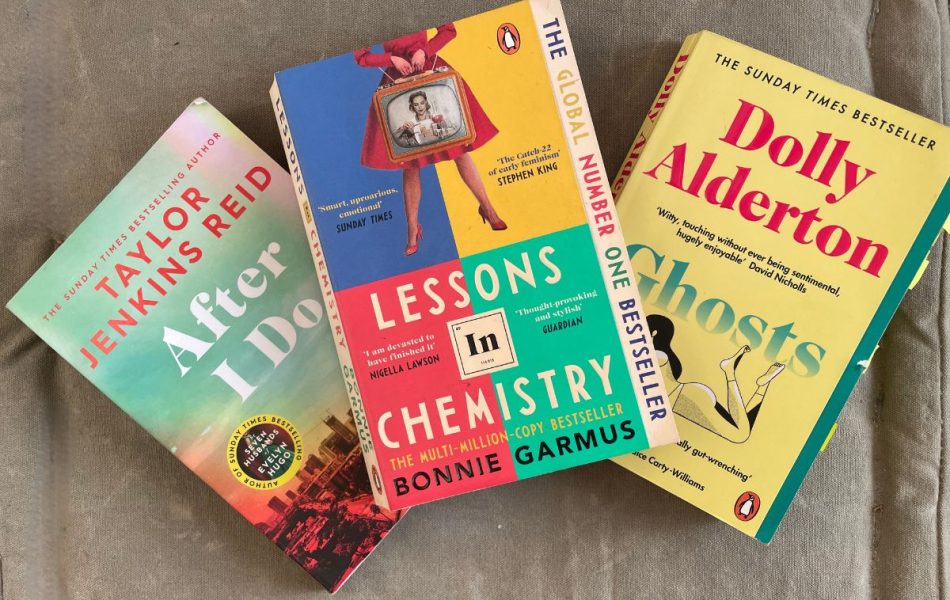
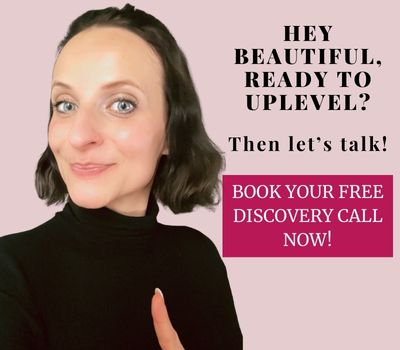



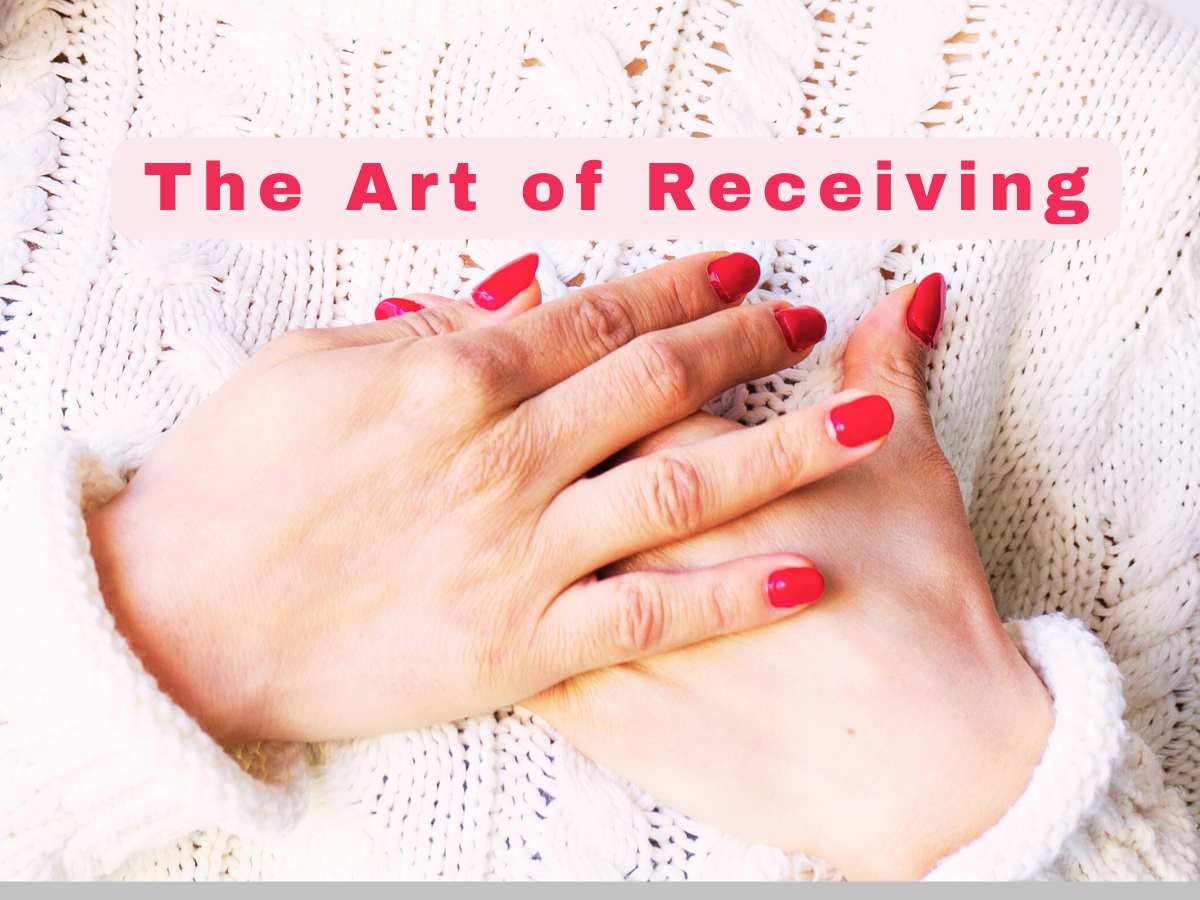
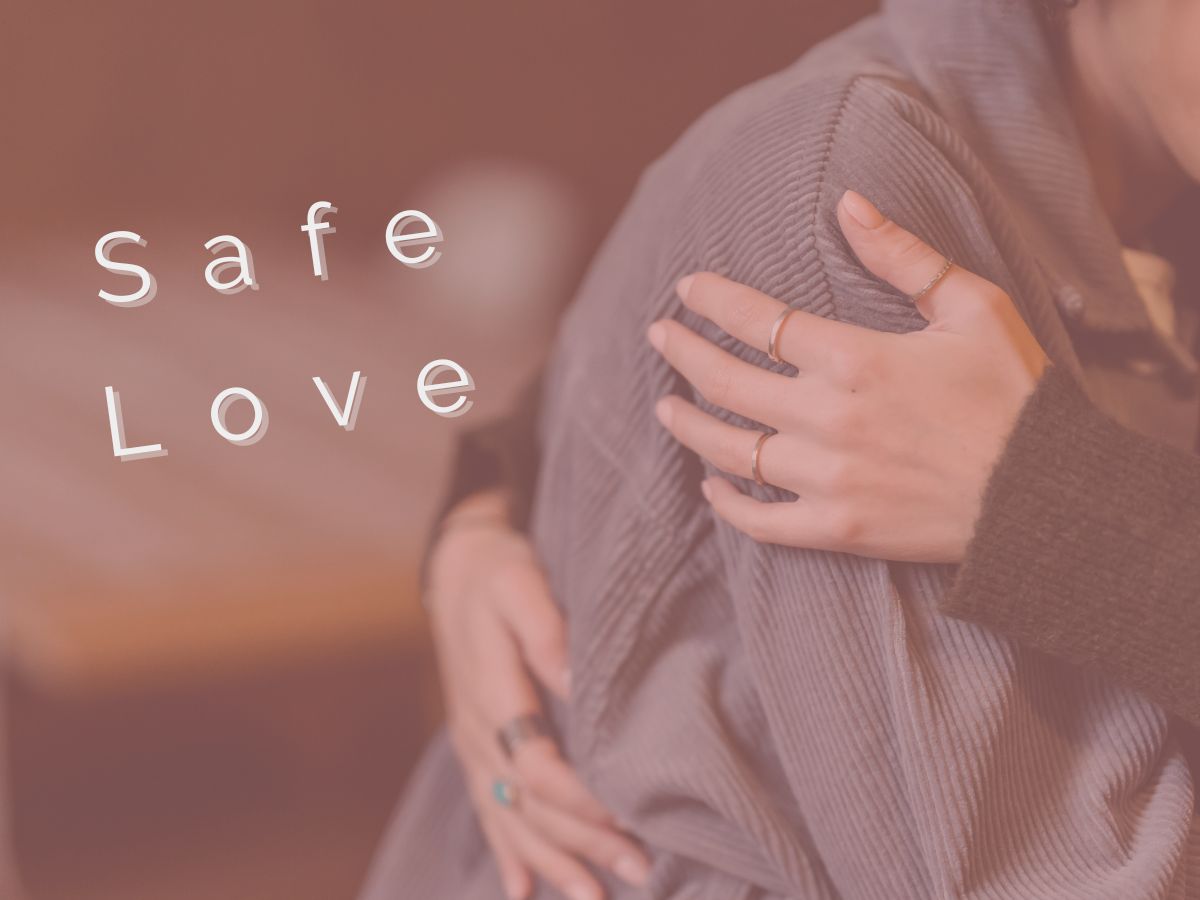

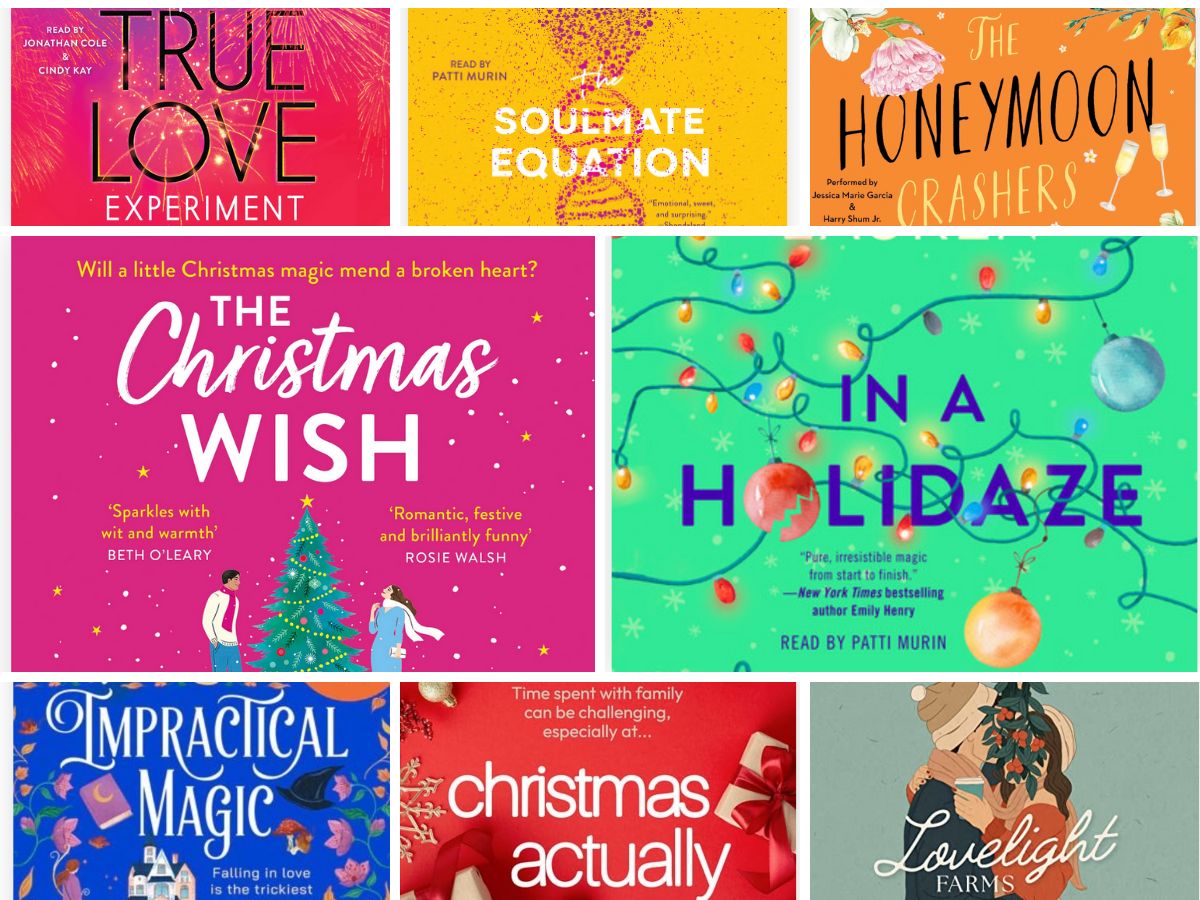
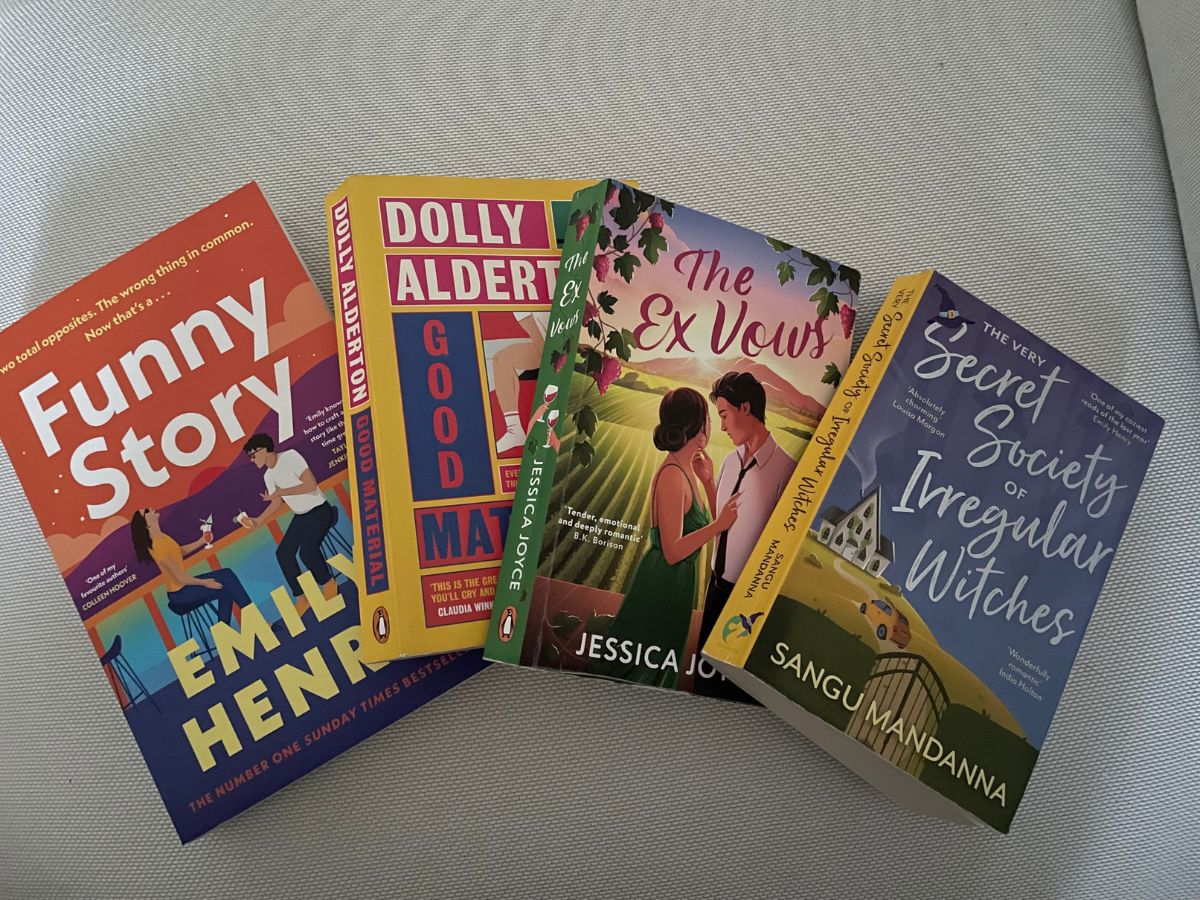
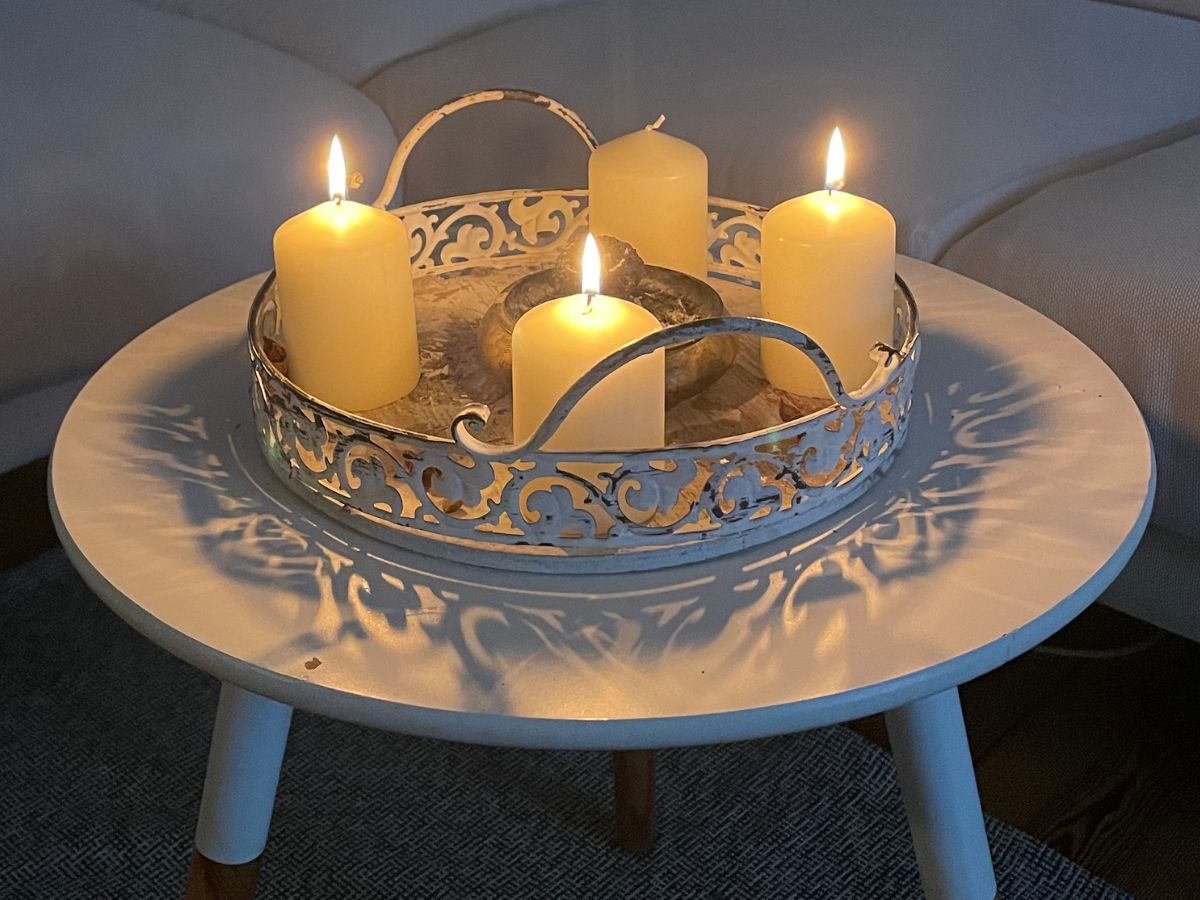




Leave a Comment